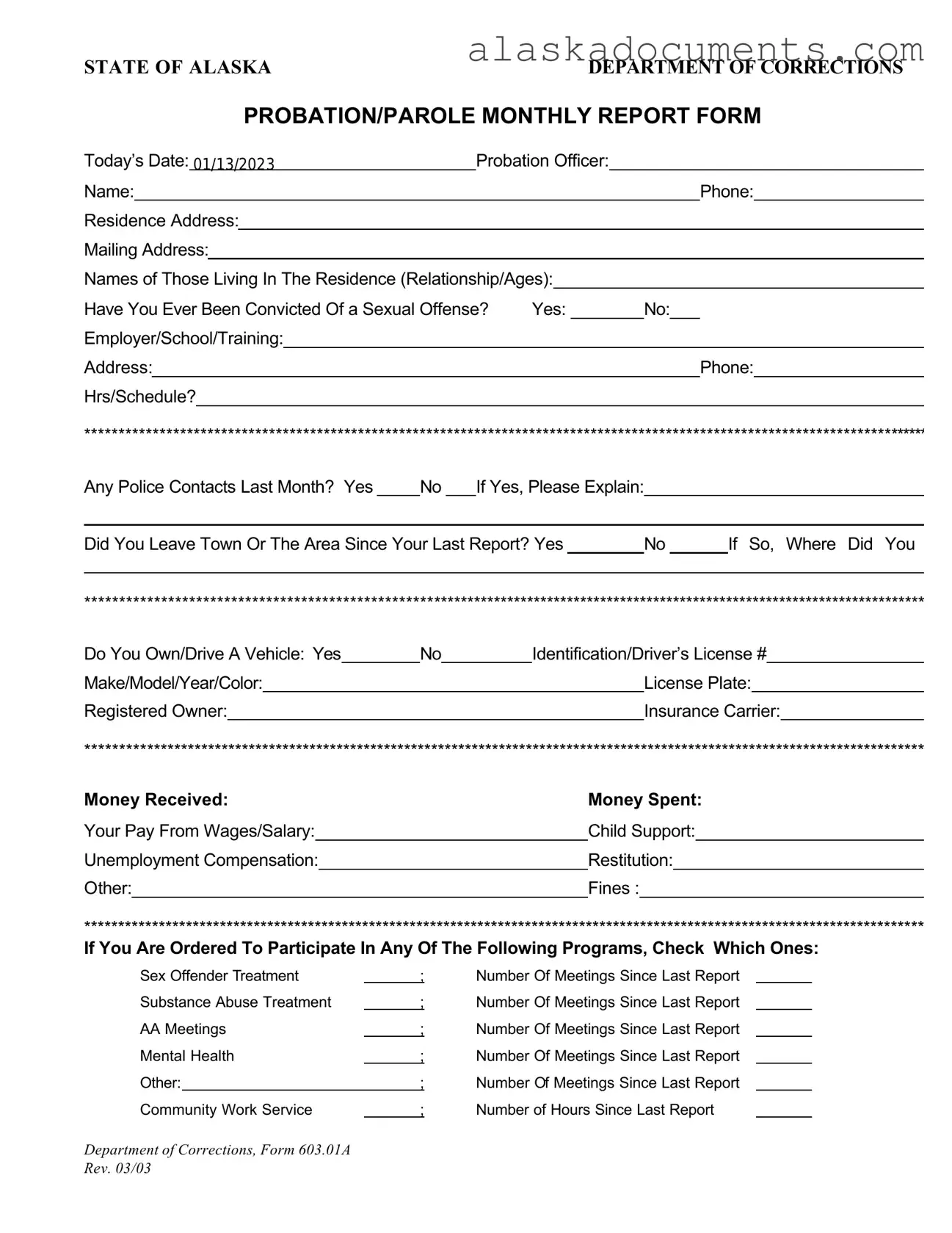The Alaska 603 01A form shares similarities with the probation report form used in many states. These forms typically require individuals on probation to provide updates on their living situation, employment status, and any police contacts. Like the Alaska form, these reports often ask about compliance with court-ordered programs and any changes in personal circumstances. This ensures that probation officers have a comprehensive view of the probationer's adherence to the terms of their probation and can address any issues that may arise.
Another document that resembles the Alaska 603 01A form is the parole progress report. Parolees must submit these reports periodically to their parole officers. The information requested often mirrors that of probation reports, including details about employment, living arrangements, and any legal encounters. Both forms aim to monitor the individual’s reintegration into society while ensuring compliance with parole conditions.
The monthly check-in form used by rehabilitation programs also bears similarities to the Alaska 603 01A. Participants in these programs are often required to report their progress, including attendance at sessions and any challenges faced. Like the Alaska form, these check-ins focus on accountability and support, allowing program administrators to assess progress and provide necessary interventions.
The family court financial disclosure form is another document that shares common elements with the Alaska 603 01A. This form requires individuals to disclose their income, expenses, and any financial support received. Both documents emphasize transparency regarding financial matters, which can be crucial for assessing compliance with court orders, such as child support or restitution payments.
The employment verification form used by probation and parole departments also parallels the Alaska 603 01A. This document typically requires individuals to provide details about their employment status, including hours worked and job responsibilities. Both forms serve to ensure that individuals are maintaining stable employment, which is often a condition of probation or parole.
The EDD DE 2501 form offers essential support for individuals who find themselves unable to work due to health issues. By submitting this form, workers can access crucial financial assistance, allowing them to maintain their income during challenging times. For more detailed information on the process of filing a claim, visit OnlineLawDocs.com, where you can find resources to help guide you through the necessary steps and requirements associated with this important form.
Community service logs are similar to the Alaska 603 01A in that they track participation in required community service activities. Individuals must document the hours completed and the nature of the service performed. This information is essential for probation or parole officers to verify compliance with court-ordered community service requirements.
The mental health treatment progress report also resembles the Alaska 603 01A form. Individuals undergoing mental health treatment must often provide updates on their therapy sessions and any changes in their mental health status. Both forms aim to ensure that individuals are receiving the necessary support and are actively participating in their treatment plans.
Substance abuse treatment progress reports are another document similar to the Alaska 603 01A. These reports require individuals to detail their attendance at treatment sessions and any drug testing results. Just like the Alaska form, they focus on accountability and progress in recovery, which is often a critical component of probation or parole conditions.
The domestic violence offender assessment form shares characteristics with the Alaska 603 01A. This document typically requires individuals to report on their participation in counseling and any incidents of police contact. Both forms seek to monitor behavior and ensure compliance with treatment requirements, emphasizing the importance of addressing underlying issues related to offending behavior.
Lastly, the court-ordered evaluation form is similar to the Alaska 603 01A in that it collects information about an individual’s compliance with various court mandates. This may include updates on mental health evaluations, substance abuse assessments, or other mandated programs. Both forms serve to provide the court with a comprehensive overview of the individual’s progress and adherence to court orders.



